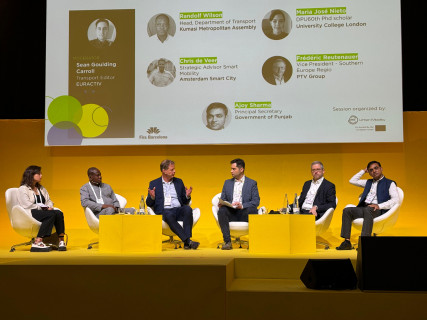At the start of November, I was lucky enough to visit Barcelona for the World Smart City Expo 2023. Together with my Amsterdam Smart City colleagues and a group of our network partners, I organized -and took part in- keynotes, panel discussions, workshops and visits to international pavilions. As this was my second time visiting the Expo with our network, I was able to keep my focus on the content amidst the overwhelming congress hall and side activities. The following text describes some of my best insights and discoveries.
Informal Transport: Challenges and Opportunities
My mobility colleague Chris de Veer took part in a panel discussion on public transport and mobility options in urban environments. Following a plea on the implementation of micro subsidies (increasing equity and efficiency of subsidies), Chris explained the Dutch efforts to get people out of theirs cars and onto bikes and public transport, and making shared mobility solutions accessible for everyone. An important story but something I’ve been working on and getting really familiar with the past year. However, when Maria Nieto, a DU60th PhD Scholar, entered the conversation the discussion took an unexpected turn.
Maria introduced the topic of Popular, or Informal, Transport. For some years, she had been studying this topic of individuals and small scale entrepreneurs organizing ‘unregulated’ transport services. While many would say that this is ‘just chaos on the streets’ (think of the Rickshaws in New Delhi, or the moped taxi’s in Asian countries), she argued how it’s actually quite an efficient and demand responsive service. With the help of public authorities, this source of livelihood for many could be implemented in urban mobility systems. And if electric vehicle alterations would be relatively cheaper, these entrepreneurs would be happy to help make this large fleet more sustainable overnight. Furthermore, they could help please our obsession for data on travel behaviour. These drivers know exactly where people are traveling to- and from!
But where to start? Randolf Wilson, head of the Department of Transport at Kumasi Metropolitan Assembly (Ghana) and Ajoy Sharma, Principal Secretary at the Government of Punjab (India) shared stories from their own districts and how they’re trying to improve this sector. They explained how the main challenges revolve around unsafe working (& traffic) conditions and unregulated pricing mechanisms. In order to get a grip on these problems they are currently doing their best to map this sector. Unions play a key role in getting as many entrepreneurs registered as possible. Through these unions, governments are able to (micro)subsidize this growing sector, collaborate with the drivers, and ‘tidy up the chaos’.
This panel made me realize how every country and region is dealing with their own mobility challenges, and how extremely organized our own mobility system is.
Pikala Bikes in Marrakech
During the congress, I had the pleasure of meeting Cantal Bakker, founder of Pikala Bikes. With Pikala Bikes, she is introducing the city of Marrakech to cycling culture and the benefits it brings to people, their health and the city as a whole. Unknowingly, I had actually visited her repair café in March, when I travelled though Morocco.
With the help of financial income from bike tours, bike rentals, repairs and the café, Cantal is training and employing Moroccan youth in the cycling and tourism sector. At the same time, the growing presence of bikes in the urban environment inspires citizens to consider biking as a means of transport instead of the popular mopeds.
However, because the local government is still hesitant in giving cyclists more space in their infrastructure plans, she’s now putting extra effort in convincing local authorities of all the benefits a growing cycling culture could bring to the city. As this is one of the Netherlands’ great export products, we look forward to help her in connecting with Dutch ambassadors and high profile names within the Dutch cycling sector and add some persuasive power to the table!
Affordable and sustainable housing
During the final day of the Expo, I decided to join a talk on the challenges and opportunities regarding affordable and sustainable housing. While I’m not professionally involved in this sector, I do have great personal interest in this global challenge.
The panel consisted of a combination of architects, researchers and city officials. I was especially impressed by John Roberson, Chief Operating Officer for the City of Chicago. His way of talking and the Chicago projects he described were inspiring. I decided to hang on for a while afterwards to speak to him.
We had a conversation about one of the aspects of our current housing crisis that intrigues me; apart from the need for more physical buildings for housing, there also needs to be more ‘flow’ in our current housing market. There are too much house owners and tenants living in a house that’s not ‘suited’ for their current stage and situation in life. Think of; elderly who are living alone in a spacious multiple bedroom house, and a starting family cramped up in a studio. He explained to me how culture and pride make this a difficult matter; people consider their (family)homes their biggest pride and property in life. Furthermore, the longer people live and settle in a place, the harder it gets to move and build up a life and social network in a different place. To overcome this lack of flow in the housing market (e.g. elderly occupying big family homes), we shouldn’t focus on measures to get people out of their houses, but we should make housing options for elderly as attractive as possible and distributed throughout the country. Moving away from family and the social circle you’ve build up throughout life, is one of the biggest reasons not to move!
A big thank you to all people involved in making this International trip happen, and I’m excited to follow up with all the new people and organizations I’ve met! See you next year Barcelona!





